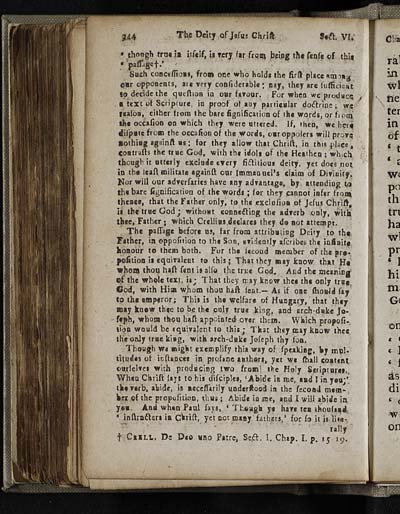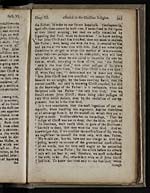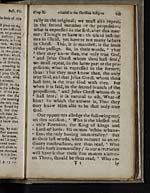1508-1800 > Divinity of our Lord and Saviour Jesus Christ
(350) Page344
Download files
Individual page:
Thumbnail gallery: Grid view | List view

344 The Deity of Jeſus Chriſt Sect. VI.
' though true in itſelf, is very far from being the ſenſe of this
' paſſage†.'
Such conceſſions, from one who holds the firſt place among
our opponents, are very conſiderable : nay, they are ſufficient
to decide the queſtion in our favour. For when we produce
a text of Scripture, in proof of any particular doctrine; we
reaſon, either from the bare ſignification of the words, or from
the occaſion on which they were uttered. If, then, we here,
diſpute from the occaſion of the words, our oppoſers will prove
nothing againſt us: for they allow that Chriſt, in this place,
contraſts the true God, with the idols of the Heathen ; which
though it utterly exclude every fictitious deity, yet does not
in the leaſt militate againſt our Immanuel's claim of Divinity.
Nor will our adverſaries have any advantage, by attending to
the bare ſignification of the words ; for they cannot infer from
thence, that the Father only, to the excluſion of Jeſus Chriſt,
is the true God; without connecting the adverb only, with
thee, Father ; which Crellius declares they do not attempt.
The paſſage before us, far from attributing Deity to the
Father, in oppoſition to the Son, evidently aſcribes the infinite
honour to them both. For the ſecond member of the pre-
position is equivalent to this; That they may know that He
whom thou haſt ſent is alſo the true God. And the meaning
of the whole text, is; That they may know thee the only true
God, with Him whom thou haſt ſent.- As if one ſhould ſay
to the emperor; This is the welfare of Hungary, that they
may know thee to be the only true king, and arch-duke Jo-
ſeph, whom thou haſt appointed over them. Which propoſi-
tion would be equivalent to this; That they may know thee
the only true king, with arch-duke Joſeph thy ſon.
Though we might exemplify this way of ſpeaking, by mul-
titudes of inſtances in profane authors, yet we ſhall content
ourſelves with producing two from the Holy Scriptures.
When Chriſt ſays to his diſciples, 'Abide in me, and I in you;'
the verb, abide, is neceſſarily underſtood in the ſecond mem-
ber of the propoſition, thus; Abide in me, and I will abide in
you. And when Paul ſays, ' Though ye have ten thouſand
' inſtructers in Chriſt, yet not many fathers,' for ſo it is lite-
rally
† CRELL. De Deo uno Patre, Sect. I. Chap. I. p. 15 19.
Set display mode to:
![]() Universal Viewer |
Universal Viewer | ![]() Mirador |
Large image | Transcription
Mirador |
Large image | Transcription
Images and transcriptions on this page, including medium image downloads, may be used under the Creative Commons Attribution 4.0 International Licence unless otherwise stated. ![]()
| Scottish printing towns > 1508-1800 > Divinity of our Lord and Saviour Jesus Christ > (350) Page344 |
|---|
| Permanent URL | https://digital.nls.uk/74618360 |
|---|---|
| Description | Divinity of our Lord and Saviour Jesus Christ, cont. |
| Description | A product of the first printing press set up in Montrose. |
|---|---|
| Shelfmark | L.36.f |
| Additional NLS resources: | |

